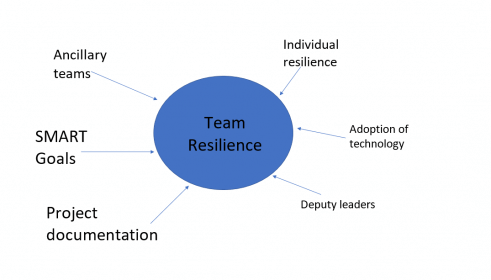Three Often Overlooked Soft Skills To Employ In Your Project Management Practice

Successful project management requires you to excel at a range of hard technical and soft skills. Hard skills often cited include forecasting, reporting and scheduling. Soft skills include leadership, communication and teamwork. It’s usually easier to know when to deploy hard skills given their application to specific and measurable tasks.
In spite of this, soft skills seem to be given considerably less coverage in project forums and general discourse. Hence, I have sought to dilate on three often-overlooked soft skills which you need to be proficient with to thrive in a project environment.
Resilience
Your team’s level of resilience reflects its ability to deal with internal or external factors that may impact on its objectives. These factors can vary considerably, from team resourcing levels to the availability of ancillary teams.
Though an exhaustive checklist of factors is not possible, Diagram 1 seeks to highlight some key factors which may impact on a project team’s resilience.
Diagram 1. Factors impacting project team resilience.

From personal experience, I’d like to comment on three of these factors.
- Individual resilience is important as staff burnout can have a big impact on team performance. Having a personal mentor and cultivating a good work-life balance is particularly helpful.
- Project documentation is vital for briefing stakeholders, particularly when there is high project staff turnover. Having up-to-date project documentation (e.g. Project Initiation Document) to hand considerably eases the transition of new staff in to your project.
- Effective use of ancillary teams can improve outcomes. For example, in my previous role, I liaised with the technical team to vet risk and method statements before presenting these to engineering managers. This helped de-risk decision making and increase approval rates of documentation. Hence, it’s important to be aware of different ancillary teams whose support can be enlisted.
Personal Branding
Your personal brand ties in very closely with the concept of self-awareness. A comprehensive view of this covers everything from your dress sense, specialist knowledge, professionalism and level of ambition.
Developing your personal brand begins with an open and honest dialogue with yourself. What are your interests? What are your key strengths? How high up the corporate ladder do you want to climb? It’s important not to forget that your personal brand needs to compliment that of your organisation. Hence, you should also ask questions like “How do I embody my organisation’s values in my day-to-day work?”
There are several questions you can pose, however, the sample answers (Table 1) can help you begin to frame the conversation.
Table 1. Sample answers for framing your personal brand.
| Question | Sample Answer
|
| What is my level of ambition?
|
Level: Programme manager
Sector: Public sector Industry: Health Type of projects: capital projects, service improvement projects
|
| What is my style of dress at work? | Day-to-day: Smart business
With clients: Smart business
|
| What are my key skills and knowledge?
|
Expert knowledge: organisational project management processes
Expert skills: change management, leadership
|
Defining your unique selling point can eventually draw others to you as a go-to person and tacitly elevate you to consultant status for your expert area, bringing specialist (and even remunerated) packages of work your way.
Political Astuteness
Politically astute project managers recognise that projects operate in politically charged environments, often impacting multiple stakeholders with vested interests. I like to call these stakeholders ‘teams within teams’ because, though often part of the same host organisation, their differing objectives are brought to light by the implementation of the project.
In my experience, two key groups of ‘teams within teams’ can negatively impact the outcome of your project:
- Those whose objectives are diametrically opposed to that of the project, who act as project blockers, seeking to halt the project in its tracks
- Those whose objectives align with the project, who will seek to use the project as a vehicle to achieve their own objectives, thereby increasing project cost, scope and duration.
I came across an example of the first group when working as a management trainee in a Northern Ireland hospital. The hospital was implementing a new surgical referral pathway championed by consultant doctors. However, this new way of working would reconfigure workloads for the administrative front of house (the ‘team within a team’), which openly opposed the new system.
The second group’s emergence became apparent in an equipment installation project I was involved in. The project required a significant infrastructure investment to proceed, benefitting several other stakeholders. Hence, a deliberation over funding routes ensued, including a debate over this singular project bearing the brunt of cost, given several other benefactors.
For Group 1 teams, managing expectations, monitoring benefits and mitigating the impact of the project as far as possible is key. Group 2 teams, who see your project as an opportunity, can be negotiated with to reach a fair and equitable settlement that reflects their impact on the cost/scope/duration of your project.
Summary
In summary, a multi-pronged approach can considerably enhance your team’s resilience. A tick-box exercise may not fully reflect the uniqueness of your team, however, the ideas presented above form a good starting point.
Second, actively manage your personal brand to a tee, from your sartorial standards to project management style. Investing in yourself will pay dividends in a matter of time. Finally, be vigilant for the political machinations at play within your project.
Proactively identify ‘teams within teams’, whose objectives are aligned to or at odds with your project. Either way, their influence and impact may need to be managed during the change cycle.
About the Author:
Ali has recently completed the Graduate Development Programme at Essentia, Guy’s and St Thomas’ NHS Foundation Trust, London. During the programme, Ali completed a project management apprenticeship while gaining experience in delivering capital projects for his NHS Trust.




